Elderberry Vinegar Recipe
Related pages:
- Elder – Identification, distribution, edibility
- Seasonal notes on elderflowers
- Elderflower champagne recipe
- wild food recipes
No matter how hard I try when serving my wild food tasting menus, this elderberry vinegar always steals the show when served as a simple wild salad dressing. It is fruity, thick and very sweet, with a depth of flavour that puts it on a par with, if not beyond, the very finest balsamic vinegars. It actually got a “wow” from the team at Andrew Fairlie’s restaurant at Gleneagles when we had a cook-in in the Perthshire hills, and I’ve promised to pass the recipe on to countless other people since.
Even better than that, elderberry has long been thought to have immune-modulating and antioxidant effects and is traditionally used in the treatment of viral infections.
How does this relate to your delicious elderberry vinegar? Well I make a point of imbibing some at least every other day through the winter, whether by the spoonful, diluted with hot water as a drink, as a salad dressing, to enrich a tomato sauce, or as the fruity base for a sweet and sour style meal – any way you like should help you to stay well as part of a biodiverse diet.
This preparation is technically a “shrub”, in this context meaning a liquid mixture of sweet and tart or a “drinking vinegar”. The name comes from the Arabic shurb, meaning drink, and sharbat, a Hindi word for an aromatic syrup made from fruit or herb and flower extracts. They appear to be all the rage in cocktail circles at the moment and I often use it to balance sweet and sour elements in wild cocktails. Read more about this here.
Not that i’m taking any credit at all for the recipe. It is in Miles Irving’s excellent “Forager’s Handbook” (if you haven’t bought it yet, you should) and he attributes it to forager-herbalist Mandy Oliver. The recipe could easily be adapted by using cider vinegar and adding onion and some aromatic spices to make it more like a traditional pontack sauce, but its simplicity appeals to me and I see no need to interfere with a classic.
This elderberry vinegar is the essential stock item in my larder – and I get quite twitchy around the end of September about having gathered sufficient berries to see me through the following year. Bear in mind that if you gorge on the elder buds and flowers during the summer, you will have less berries come autumn – careful resource management required! Read more about the all-round wonder-wild food resource that is the elder tree by clicking here.
I use it as salad dressing, sauce enricher, marinade, to give depth to stews and even diluted with boiling water in my flask when in the mountains. It is so sweet, fruity and warming that its easy to forget that it is a vinegar – though I have had funny looks from Mountain Rescue colleagues when offering them a cup! Apart from the sugar, it is really good for you: high in flavanoids, anthocyanins and vitamins A and C.
This recipe also works well for other fruits such as blaeberries, blackcurrants and raspberries.
- Remove the elderberries from their umbels using a fork or place them in the freezer and remove the berries easily while they are still frozen. I accumulate berries in my freezer in dribs and drabs throughout autumn then make a big batch.
- Weigh the berries before placing them in a suitable kilner or tub then add 500ml of white wine vinegar for every 350g of fruit.
- Leave covered for 3-5 days, stirring occasionally.
- Strain off the liquid (discard the berries) and add 350g of sugar per 260ml of liquid.
- Simmer for 10 minutes then bottle.
The resulting sweet, unctuous vinegar will keep very well. I can’t say for how long because no matter how much I make, I always end up having to eek out the last little bit until the next year’s elderberries appear!
Here are some of the ways I have used elderberry vinegar in my Daily Wilds:
Sweet pickled herring on rye bread, wild garlic, lesser celandine, sea radish, elder vinegar. I love pickled herring and have eaten countless variations on this theme throughout the spring. It looks quite elaborate but takes less than 5 minutes to throw together – so long as your herring is already pickled! The elderberry vinegar tempers some of the more pungent leaves and unifies the whole dish.
I have’t found a salad yet that isn’t improved by elderberry vinegar. Here with pennywort, sea sandwort, garlic mustard and sea kale shoots, buds and flowers.
Roast teal with wood blewits, caramelized reedmace, elderberry sauce, sea beet and scurvy grass.
Elderberries go very well with game. I used the vinegar with wild juniper and thyme to marinade a haunch of venison for our christmas dinner.
Related pages:
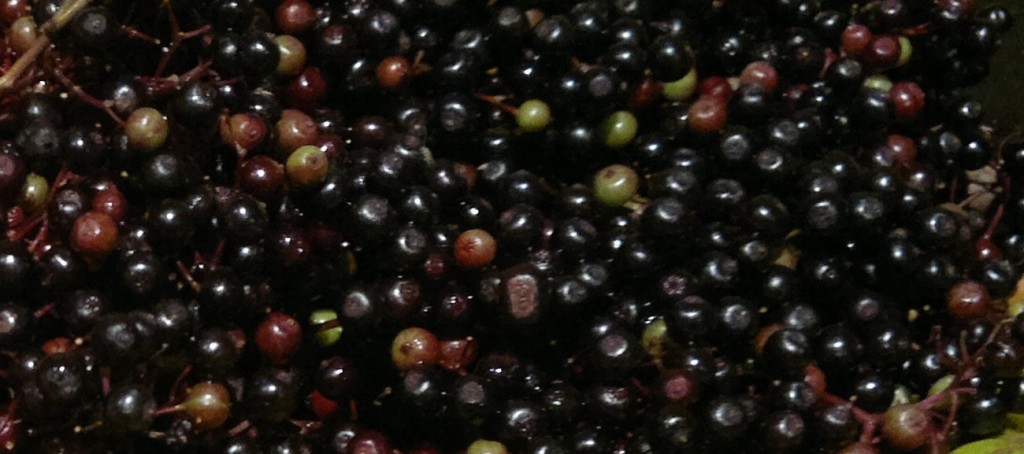
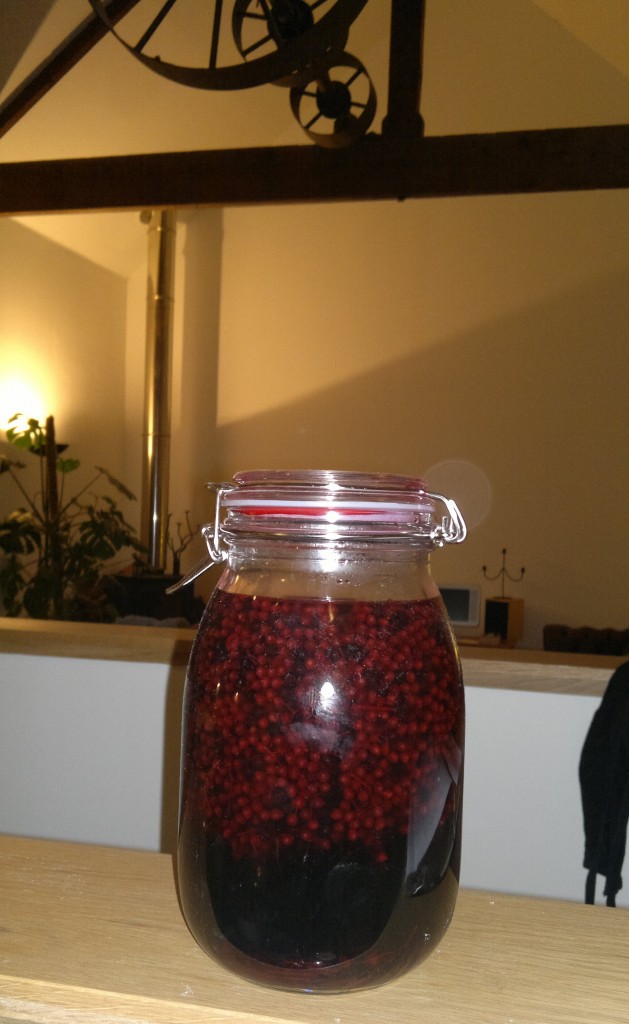
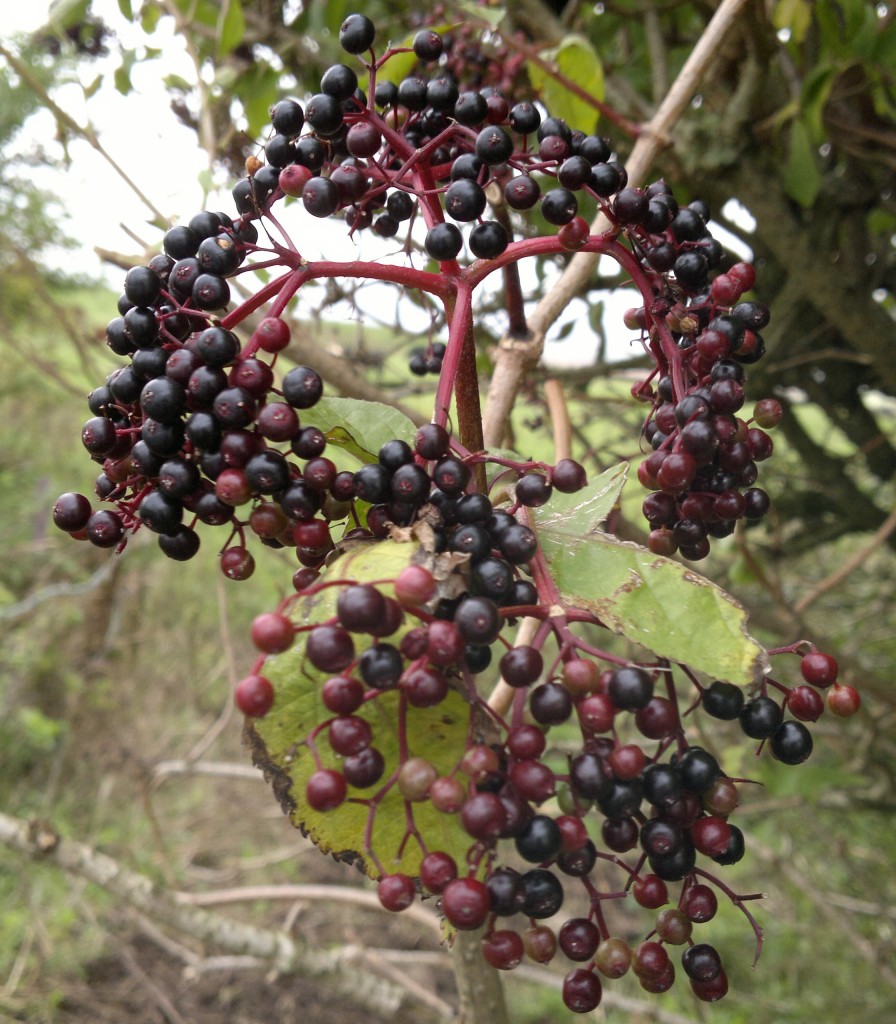
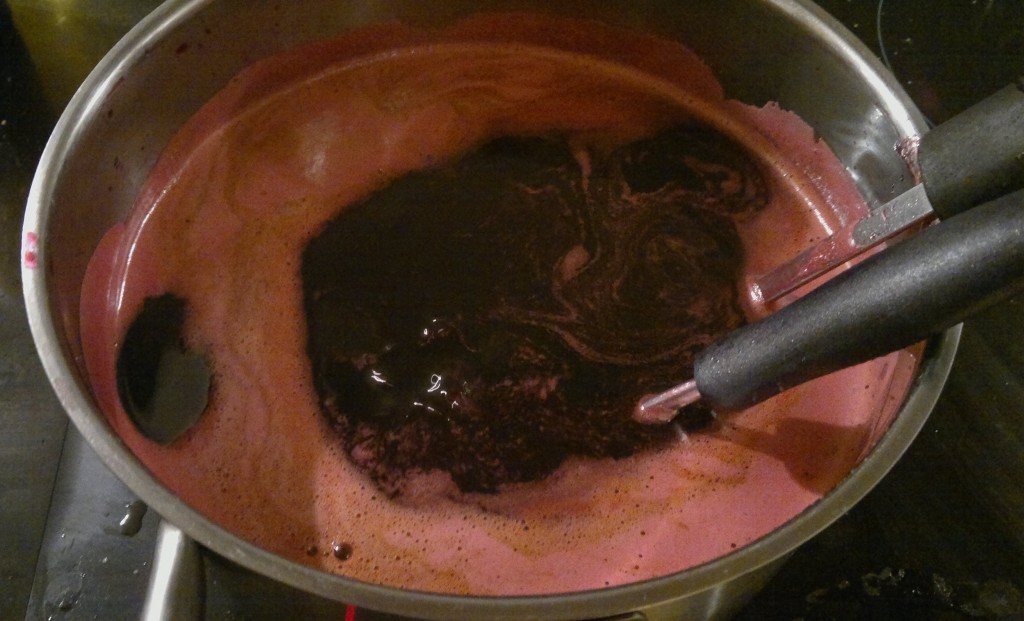
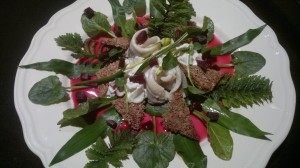
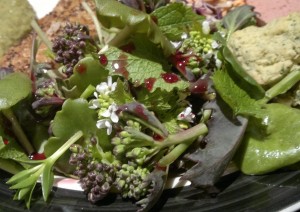
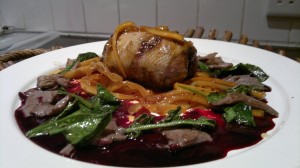
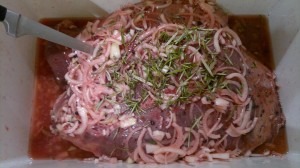
59 Comments
Looks great – any reason I can’t just throw the vinegar, sugar, and berries in the kilner jar together at the beginning? Wouldn’t it improve the extraction from the berries, a bit like the sugar in sloe gin? Also, is the boiling a reducing step, or is it effectively pasteurisation to improve keeping, or what? Sorry for the 20-questions! Great recipe, going to make some as soon as possible!
Hi Kate,
All sounds worth a go! The simmering is only for 10mins – so not really a reducing step. More to meld the 3 ingredients I think. Let me know if any experiments improve the recipe – though hard to imagine it tasting any better! Happy preserving,
Mark.
Isn’t is also necessary to boil the berries as I understand uncooked berries are mildly toxic/laxative..
You are correct, which is why the recipe includes simmering the liquid for 10 minutes. The precursors to hydrogen cyanide contained in elderberries are volatile and evaporate at around 27˚C, so this is more than sufficient.
Must try this recipe. I have made Elderberry Cordial this year and for a few years have made Apple Cider Vinegar, also Apple Juice so understand the need to pasteurise for longevity and
steam off toxins so I am relaxed about drinking Elderberry Cordial. My wife and I enjoy the Cider Vinegar on salad and as a marinade for pork. I drink vinegar straight in a shot glass if the flavour is right! Looking forward to trying Elderberry Vinegar as a drink, dressing or marinade!
Thanks.
I have masse this recipe, it is probably the most delicious thing I’ve ever made! My family are besotted & I’ve had to make litres of it! I too drink it warm & diluted.amazing!
Great! Glad you like it. I use it most days and haven’t had a cold for ages!
Three years later and here I stand making another 8litres of the gorgeous stuff of life.
We love it.. And look forward to it being cooled so that we can test it…..!
Love this recipe! And I have the Miles Erving book and have missed it!! Can’t wait to give this recipe a try- I have been monitoring the elderberry bushes, and not long now! Thanks for sharing! Love the blog, I’ll keep reading! 🙂 Charlotte
I’m going to make this vinegar it sounds amazing. When straining off the liquid are you supposed to squash and press the elderberries to maximise flavour extraction? Have you ever made green elderberry capers? I’m intrigued to see what these taste like.
Hi Mike, Yes, a bit of squishing would help. I have never made green elderberry capers, intriguing though they sound, because I can’t help but see it as a waste of future berries for vinegar! There seem to be lots of other things available for capering…but please let me know if the green elderberries are outstanding and I will tweak my resource management!
Just a question really as I have not used your recipe yet. Can the elderberries be used in a no cook recipe I have to replace raspberries. Can the sugar also not be added. Thanks Ian
Hi Ian, I don’t know. Please experiment and let me know how it turns out. You may very well discover a new delight.
Love this from my childhood, 60 years ago, when we had the vinegar thick and warm, over Yorkshire pudding. A gorgeous desert!
Your elderberry vinegar was amazing with the smoked duck today – perfect match!
Hi Mark. I was always told not to eat raw elderberries in any quantity because they contain small amounts of cyanide, so it might be safer to stick to the simmering?
Hi Hilary,
Lots of things contain small amounts of cyanide – seldom enough to be dangerous – but yes, the best advice is to always cook elderberries. I certainly don’t eat them raw.
hi mark
I made this elderberry vinegar to your exact recipe and its fantastic I had a bottle left to one side to see how it matured over a year and the taste is amazing even better with age. do you think you could make this vinegar using yew berries with out the stone or is this just too extreme would the poison content be too much I’ve eaten a few yew berries and enjoyed the taste not sure about a vinegar or possibly a syrup
regards
chris
Hi Chris,
To the best of my knowledge, yew berries will be fine, provided you remove the seed. People may raise an eyebrow when you offer them yew syrup though…
Let me know how it turns out.
Cheers,
Mark.
Hi Mark
Geoff (my husband) tried a version where he didn’t steep the berries but immediately simmered in the vinegar with the sugar, then strained through a fine sieve, mashing the berries as he did so. It’s worked brilliantly, but it’s more like an extremely intense flavoured jelly rather than the syrup…
Could you do the same syrup with hawthorns or rowans?
Best wishes
Carri
Hi Carri,
Sounds great. There are loads of ways to capture flavour.
Haws and rowan berries don’t share the same juicy qualities, so may not be quite so interesting – but please do give it a go! Wild food is all about experimenting – let me know how it turns out. 🙂
Hi there,
What type of sugar do you recommend? I was thinking of a dark soft brown sugar?
Thanks,
Kate
Hi Kate,
I use organic unrefined golden granulated sugar. Dark brown could be really interesting. Let me know how it turns out.
Mark
Can you process the jars afterwards in a hot water bath for a longer shelf life? Thanks!
With all that sugar and vinegar, this keeps almost indefinitely without further processing. If you are worried about any syrup going off, just add a glug of vodka – vastly increases the shelf life.
Thanks for this great recipe…I’ve just made my first batch of elderberry vinegar and it’s lovely, really rich and fruity.
Re ‘is it ok to squash the pulp to get all the juice out’, years’ of experience of fruit vinegars and jellies has taught me that it will spoil the clarity and intensity of colour of the finished product, but the flavour will not be really compromised.
Off to pick some more tomorrow!
Hi, just started to soak my elderberries. Was wondering if you have tried the recipe using less sugar … I guess it would keep for a shorter period of time?
Hi Ruth,
Do try then let me know. The joy of this recipe is the sweet, almost balsamic quality. Less sweet vinegars can also be delicious, but in quite a different way.
This version keeps pretty much infinitely.
Cheers
Mark
Hi Ruth and Mark
I found my first batch made to Mark’s recipe a tad sweet for my pallate so I took a small bottle and diluted it 50/50 with some raw white wine vinegar and loved it. My next batch of 8Lts I made with the sugar weight halved and it turned out remarkably well, much more like a fine balsamic than a syrup. This was to suit me of course. I also made 2Lts each of strawberry and raspberry to Mark’s recipe for my kids and they absolutely can’t get enough of it. Thanks again for the recipe Mark.
Cheers
Kenneth
When you say ‘keep covered for 5 days’, do you mean out of the fridge? Just picked my first elderberries ever and can’t wait ti try this!
Hi Karoline,
No, it doesn’t have to be in the fridge.
Cheers
Mark
I’m fairly sure the cooking removes the vomit bit from raw elderberries. Am going to make up a nice big batch of this stuff. Maybe fling a few hogweed seeds in. 😉 . Green elderberries are one of my favourite capers. Tiny and a little crunchy too. So many elderberries about one could go mad.
Ever tried it with balsamic?
No. As it already comes out like balsamic, that could be ridiculously tasty! I have some birch syrup balsamic which is pretty damn good!
I too will have some of that syrup. Very generous mouse. 😉
I am out of fresh Elderberries but have some dried. Can I use them? Will it taste the same? Would I have to do anything different?
Hi Sandra, I don’t know, never tried. I suspect it would be quite different, but maybe worth a go. I freeze all the elderberries I don’t use fresh. In fact most soft fruit.
Did the dried Elderberries, and it turned out great. I used only 1/2 the amount of berries. Will have to try to get some fresh berries and see if they taste the same. Followed your directions except for the berries. Thank you for the recipe.
Hi Mark, what a beautiful recipe. I picked my elderberries last weekend and have just finished bottling the vinegar…..one spoon for me, one spoon for the bottle, one spoon for me, one spoon for the bottle! Something tells me I need to go and get more elderberries to make another 5 batches! 🙂
Ha, lovely! So glad you are enjoying it. You’ve reminded me to go hit my elderberry patches – thanks!
Mark.
Last yearwe were on holiday and I missed the best of the elderberries so I used your recipe and substituted sloe berries. My husband says it tastes amazing but it has become so thick that we can’t get it out of the bottles. Any suggestions please.
Try heating the bottles in a water bath or microwave. Should make it more runny. Once you’ve got it out, dilute with vinegar and/or water, rebottle.
I am getting ready for my elderberry harvest later this month and I am currently making apple cider vinegar with an early apple crop. I love the idea of this recipe, but I am hoping to adapt it for raw honey. Could I boil just the elderberries and vinegar after letting them steep together, and add the sweetener (honey) after it’s cooled a bit? Or is it essential for the mixture to boil together with the sugar? Thanks!
Hi Anna, Sounds great. I’m sure this would work. The technical name for a shrub (sweet drinking vinegar) that is sweetened with honey is “oxymel” – try googling that for tips.
Have you ever tried it using cider vinegar instead of white wine…is the taste too strong?
Yes – works great. Possibly even nicer, and can be sourced locally.
Hi!
So incredibly excited to give this a try! picked my berries this evening and ready to go, one quick question though, do you cover (use the lid) on your kilner or do you just cover with a cloth to let it breath a bit? I did review the other comments and could not locate this…
Thanks!
Shannon
I put a lid on the container
Wow. Made this today. It’s absolutely gorgeous and delicious and lovely. I’ve added another load of vinegar to the berries to see if I can make a second pressing do to speak. Fingers crossed.
Just finished making the first of my 2018 batch. This is now the third year that I have made it and wouldn’t be without it especially for a hot drink for those with colds and sore throats. Just warn novices that you haven’t handed them a mug of Ribena, or, if you are feeling mischievous, don’t tell them and watch their faces when the vinegar hits them! Haven’t had anyone who, after the initial surprise, hasn’t t thought it was brilliant.
Hi I steam extract the juice from the berries.
Then I have elderberry juice. I want to know how to make flavored vinegar with the elderberry juice.
THANK YOU
Damn I adore elderberries, was meaning to get around to making cordial with them this year but left it too late; I’ll have to try this vinegar as soon as it’s time next year. God-willing.
Hi Mark great website. I have made elderberry vinegar several times and love it have you ever aged it a wooden barrel. I’m thinking this would enhance the flavour
Hi Mark. I’ve just made this vinegar. Simmered for about 15mins but it never became unctous? Just a tiny bit thicker than the original vinegar. Drank some with hot water, lovely & warming. Should I return to pan & boil until the consistancy becomes more unctous? Thanks. Fay
Hi Fay, I guess you could, but if you are happy with how it tastes, then why bother?
Hi ,
I am in the Sierra Nevada in Northern California. I use a juice extractor to get my elderberry juice after freezing the berry’s to pop them off the stems. I started making elderberry balsamic vinegar last year after making honey elderberry sauce for health and jelly for years. I need direction , I thought for the flavored vinegar you ad 3 cups organic apple cider vinegar to one cup Elderberry juice then let it sit in the dark for 10 days. Then cook down with brown sugar to get a syrup. Thank you for any help ..Also is there a secret to growing the Elderberry ?
I harvest Wild but have tried to grow them , no success there yet.
I look forward to coming out that way to visit someday.
I have not found the recipe from last year but it was awesome. Mary
Hi Mary, I’m sure your juice technique would work fine. I’m a forager, not a gardener, but i’m told that elder is very easy to propagate just by planting viable twigs.
Best wishes,
Mark.
Hi. Just wondering if you ever use the elderberries that you strain of for anything – perhaps chutney? Or do you think all the goodness has gone out from them? And other recipes I’ve seen suggest leaving elderberries to soak for 5-6 weeks. This year I haven’t found the time till now to do the cooking so they’ve been sitting in vinegar for 10 weeks or more. Flavour seems fine but do you think there’s any problem with leaving it so long?
Hi Kate, Provided you heat the vinegar to evaporate the cyanogenic glycosides, there should be no issue with safety. Flavour may be impaired a little, as long steeping can start to break down cell walls, leading to more vegetal notes, though this is usually more of an issue with alcohol extraction (tinctures). I personally find the post-steeping elderberries to be quite well spent, but no harm in trying to get more out of them – provided you heat whatever you make before consumption. Mark.
2 Trackbacks